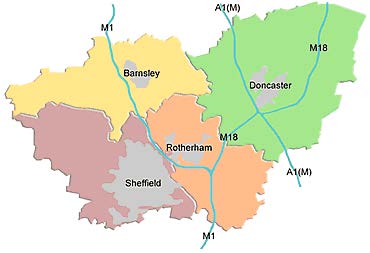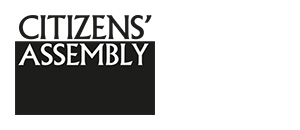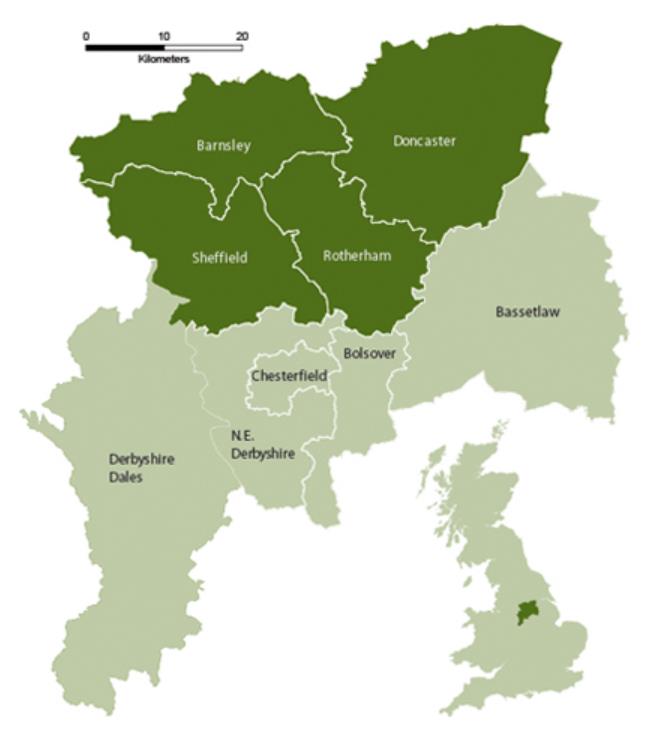In this page:
- This pagw sets out current local government arrangements in the area in and around Sheffield.
- South Yorkshire has four ‘unitary’ councils: Sheffield, Barnsley, Doncaster and Rotherham. These councils are responsible for providing local services in their areas.
- The Sheffield City Region includes Sheffield, Barnsley, Doncaster and Rotherham, plus four councils in Derbyshire and one in Nottinghamshire.
- A new ‘devolution deal’ for the Sheffield City Region has just been agreed, which means some powers will be transferring from central government in London to this region.
Local councils in South Yorkshire
 South Yorkshire is made up of four unitary authorities – Sheffield, Barnsley, Doncaster and Rotherham. From 1972 to 1986, the area was also covered by the South Yorkshire County Council.
South Yorkshire is made up of four unitary authorities – Sheffield, Barnsley, Doncaster and Rotherham. From 1972 to 1986, the area was also covered by the South Yorkshire County Council.
- Sheffield and Barnsley councils operate with a council leader and a cabinet. The Labour Party is in the majority in both councils, and thus all of the leaders and cabinet members are drawn from Labour.
- Doncaster has an elected mayor. The current Mayor is from the Labour Party. Labour also have a majority on Doncaster council, and hence the Mayor’s cabinet are also drawn from the Labour Party.
- Rotherham normally has a council leader and a cabinet, like Sheffield and Barnsley. Labour has a majority on the council, and the leader and cabinet are therefore from the Labour Party. At the moment, however, the council is being run by five Commissioners appointed by the government, in the wake of the recent child abuse scandal. They are expected to be in post until April 2019. During this time, the council leaders have only an advisory role. This is a very unusual situation.
What do the councils do?
The councils are responsible for providing a wide range of local services. In some policy areas – such as provision of libraries and leisure centres – they have considerable power to decide the level of the service that they want to provide. In other areas – such as waste collection, education, and social services – they have to meet service standards that are set down by central government.
For further details on the services provided by local councils, see Paper 1.3.
Other bodies delivering local services in South Yorkshire
The South Yorkshire Fire Service and South Yorkshire Police cover the same area as the four unitary authorities. The area is also covered by the South Yorkshire Passenger Transport Executive, which is responsible for bus services, park and rides, concessionary fares and the South Yorkshire Supertram.
There are four Clinical Commissioning Groups (the basic building blocks of NHS services), covering the same areas as the four local authorities.
Local councils do not control these various bodies. But they do exert influence on them through a range of boards and partnerships.
The area is covered by a Local Enterprise Partnership (LEP), which is a partnership between councils and local business with a role in promoting economic development. The LEP covers the whole of the Sheffield City Region.
Rural parts of South Yorkshire also have another layer of councils below the unitary councils. These are called either parish or town councils. They have very limited powers, and there are no such councils at all in the main built-up parts of the region.
Sheffield City Region Combined Authority
The current government believes that local councils, particularly in large urban areas such as South Yorkshire, are too small to promote regional development effectively or to deliver the best public services. As part of this, ‘combined authorities’ are being established that link local councils together. These combined authorities receive extra powers from central government.
As part of this move, the Sheffield City Region Combined Authority (SCRCA) was established on 1 April 2014. Sheffield, Barnsley, Doncaster and Rotherham are full members of the SCRCA. The SCRCA absorbed responsibility for the Passenger Transport Executive. Four district councils in Derbyshire are ‘associate members’ of the combined authority: Bolsover, Chesterfield, Derbyshire Dales, and North East Derbyshire. So is Bassetlaw in north Nottinghamshire.
The Sheffield City Region includes all of these nine council areas. This area crosses over ‘traditional’ county boundaries. This particular area was selected when proposals for Local Enterprise Partnerships (LEPs) were put forward in 2010. The proposal said that the area reflects local commuting patterns and trade connections, which cut across the old boundaries.
The Sheffield City Region currently has powers as agreed in the Sheffield Devolution Deal of 2014.
The Sheffield Devolution Deal, 2014
The government wants city regions such as Sheffield to take on new powers and responsibilities, particularly to promote economic development. In December 2014, the Sheffield City Region combined authority became the second area (after Greater Manchester) to agree a ‘devolution deal’ with government transferring such powers.
This includes:
- joint working with the Skills Funding Agency to distribute the Adult Skills Budget and the Apprenticeship Grant for Employers for the city region
- exploring joint commissioning of the Work Programme – to provide welfare-to-work schemes – between government and SCRCA
- business support funding and advice, which are currently provided both locally and by the government
- greater control over local transport schemes, including the Rotherham tram-train pilot
- work towards the creation of a ‘smart ticketing’ system (like London’s Oyster Card)
- a joint assets board formed by SCRCA and the Homes and Communities Agency (HCA) to take decisions over the disposals of land and buildings owned by the HCA.
More devolution for the Sheffield City Region
The powers announced for the Sheffield City Region in 2014 were less broad than those that the government had offered to Greater Manchester a few months earlier. But SCRCA made a bid for further powers in August 2015, and a new deal was announced on 2 October. This forms the basis for the first of the reform options that Assembly North will consider.
Where to from here?
- The Sheffield City Region Combined Authority agreed to an initial Devolution Deal with the government in December 2014.
- It agreed a further deal this October. This means that some powers will be transferred to the Sheffield region from central government, though these powers won’t be as extensive as those offered in the Greater Manchester.
- A condition of the agreement is that an elected mayor will be introduced for the entire city region. That is despite two thirds of voters in Sheffield rejecting an elected mayor in May 2012.
- Further details on Devolution Deals.

